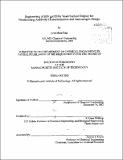Engineering of HIV gp120 by yeast surface display for neutralizing antibody characterization and immunogen design
Author(s)
Mata-Fink, Jordi
DownloadFull printable version (13.33Mb)
Alternative title
Engineering of Human Immunodeficiency Virus gp120 by yeast surface display for neutralizing antibody characterization and immunogen design
Other Contributors
Massachusetts Institute of Technology. Department of Chemical Engineering.
Advisor
K. Dane Wittrup.
Terms of use
Metadata
Show full item recordAbstract
The sequence diversity of glycoprotein gp120 of the envelope spike of Human Immunodeficiency Virus (HIV) allows the virus to escape from antibody selection pressure. Certain conserved epitopes, like the CD4 binding site, are required for viral fitness and antibodies against these epitopes are able to neutralize HIV from multiple clades. Passive immunization experiments suggest that eliciting such broadly reactive antibodies by vaccination may provide protection, but so far this has proven impossible. In this thesis, we establish a yeast surface display system for the development of gp120-based molecules for antibody characterization and immunogen design. A stripped core gp120 is constructed that retains the correct presentation of the CD4 binding site. Epitopes of several CD4 binding site-directed antibodies, including the gold standard antibody VRC01, are mapped with yeast displayed mutant libraries. A panel of immunogens that share the epitope defined by VRC01 but are diverse elsewhere on their surfaces is designed. Mice immunized sequentially with the diverse immunogens elicit an antibody response that is focused entirely on the VRC01 epitope. The serum cross-reacts with gp120 from multiple clades. Monoclonal antibodies from these mice are isolated and characterized.
Description
Thesis (Ph. D.)--Massachusetts Institute of Technology, Dept. of Chemical Engineering, February 2013. Cataloged from PDF version of thesis. "February 2013." Includes bibliographical references.
Date issued
2013Department
Massachusetts Institute of Technology. Department of Chemical EngineeringPublisher
Massachusetts Institute of Technology
Keywords
Chemical Engineering.